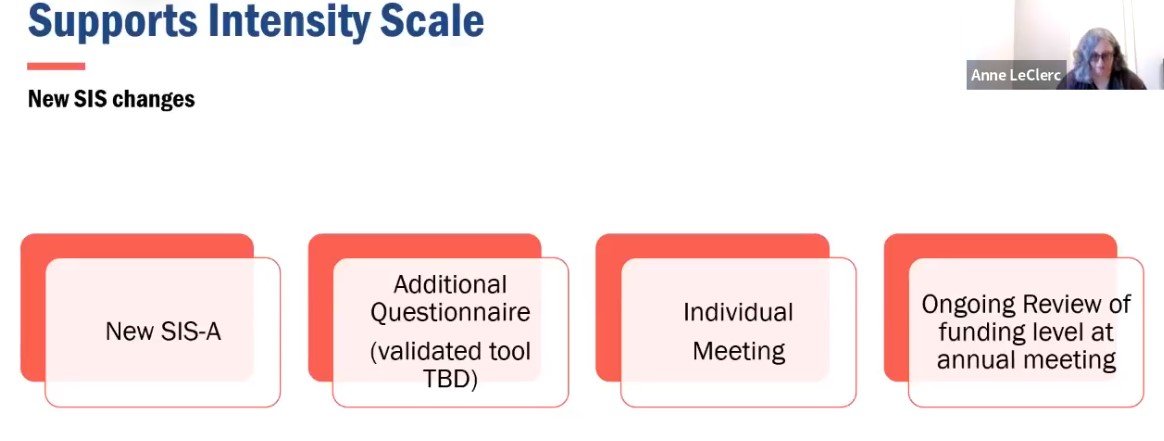Low Wages Create Labor Shortage in RI DD Services; Advocates Testify for Higher Pay
/By Gina Macris
Low wages for workers who provide direct care for adults with disabilities in Rhode Island have led to such a crisis that some agencies lose 80 percent of their front-line staff within six months, although the average annual turnover rate is 33 percent.
To fill the gap, their employers spend millions of dollars in overtime and in training new hires, only to lose them again.
Advocates for the developmental disability service system spelled out the consequences of poverty-level wages for direct care workers during a hearing before the Senate Finance Committee March 21.
A Rhode Island College expert submitted written testimony which said that an underpaid workforce results in instability, anxiety, and a diminished quality of life in the people it serves.
The new developmental disabilities director, Kerri Zanchi, also linked the stability of the workforce to the quality of services and outcomes for the people it serves.
Governor Gina Raimondo has proposed adding $6.1 million for raises to direct care workers in the budget beginning July 1. If it passes, it would provide the second annual raise –albeit a modest one – for some 4,000 part-time and full-time caregivers.
The first raise was enacted under pressure from federal enforcement of a 2014 consent decree. The $5-million line item added about 36 cents an hour for front-line caregivers, giving them an average of $11.18 an hour retroactive to July 1, 2016, according to Sen. Louis DiPalma, D-Middletown, the first vice-chairman of the Senate Finance Committee.
DiPalma is leading a drive to increase the average wage for direct care workers and home health care workers to $15 an hour by July 1, 2021. Testimony during the hearing indicated that Massachusetts is on track to reach that goal in 2018.
DiPalma also noted that Rhode Island’s minimum wage rose 30 percent between 2012 and 2016, from $7.40 an hour to the current $9.60 an hour, while the average pay for direct care workers increased 1.6 percent during the same period.
Governor Raimondo is seeking a 90-cent increase in the minimum wage, or $10.50 an hour, for the fiscal year that begins July 1.
The interstate disparity in wages, compounded by the fact that many Rhode Island residents can just as easily work in Massachusetts as in their home state, puts the developmental disability system at a distinct disadvantage in competing for employees.
Rhode Island’s system is “economically inefficient,” said Jim Parisi, spokesman for the Rhode Island Federation of Teachers and Health Professionals, who represents workers at Trudeau Memorial Center, one of about three dozen private developmental disability service providers in the state.
Donna Martin, director of the Community Provider Network of Rhode Island (CPNRI), said that an average of about 16 percent of jobs go unfilled, forcing employers to use overtime to fill vacant shifts, particularly in situations where safety requires a certain minimum level of staffing.
In some agencies the job vacancy rate is as high as 25 percent, according to Rebecca Boss, the acting director of the Department of Behavioral Healthcare, Developmental Disabilities and Hospitals.
Martin, meanwhile, said reports from 18 of the 25 CPNRI member organizations indicate they spend a $2 million a year on overtime, suggesting that the total statewide could be higher. Turnover, which includes training new hires, costs an average of about $4900 per person, she said.
A raise this year is expected to be slightly bigger than the average of about 36 cents an hour enacted in the current year. The exact amount is difficult to calculate in advance because the rate the state pays providers reflects wages and some, but not all, overhead costs, Martin said. And overhead costs vary from one provider to another.
The workforce crisis is the biggest single issue her membership faces, Martin noted. Data she submitted to the committee indicated that the demand for staffers who provide direct support of adults with developmental disabilities is expected to grow 38 percent by 2022.
In written testimony, A. Anthony Antosh, director of the Sherlock Center on Disabilities at Rhode Island College, linked the labor shortage to a diminished quality of service for individuals with disabilities – an issue which is at the center of ongoing enforcement efforts of the 2014 federal consent decree.
With some agencies losing more than 80 percent of new hires within six months, Antosh said, workers cite low pay and the complexity of the work as the chief reasons they leave. They must work two or three jobs simply to make ends meet, he said.
A growing body of research documents that a stable, high quality direct support staff produces positive results in the population it supports. Those benefits include “increased personal competence, increased employment, increased social networks and social capital and increased satisfaction with life,” Antosh wrote.
“A direct support workforce destabilized by low wages, limited opportunities for professional development and a lack of a career ladder results in instability and anxiety in the lives of the people they support,” Antosh said.
Those who depend on services have “decreased opportunities for community connection, decreased employment, and a general decrease in quality of service,” Antosh said.
Quality service, with access to community-based employment and non-work activities, are a key goal of the 2014 consent decree and a subsequent court order, which aim to enforce the 1999 Olmstead decision of the U.S. Supreme Court.
That ruling re-affirmed Title II of the Americans With Disabilities Act, which says that individuals with disabilities are entitled to receive services in the least restrictive environment that is therapeutically appropriate.The decision presumes that the community is the least restrictive environment.
At right are submitted to the the Senate Finance Committee March 22 by the Community Provider Network of Rhode Island, a trade association of 25 private agencies that provide services to adults with developmental disabilities. In the graphic, DSP stands for "Direct Support Professional," the title given to front-line workers. The average hourly wage does not include raises enacted that took effect July 1, 2016.






























